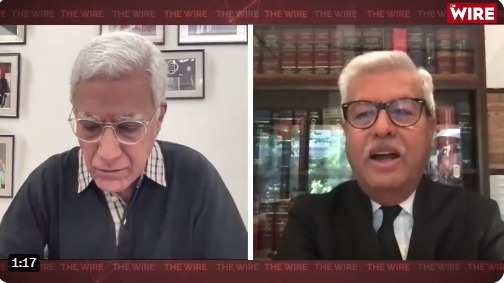1 May 2024: In a recent exclusive interview with Karan Thapar for The Wire, Dushyant Dave, a renowned legal expert and former president of the Bar Association of the Supreme Court of India, delivered scathing criticisms against Prime Minister Narendra Modi. Dave’s remarks centered on Modi’s alleged violations of the Model Code of Conduct (MCC) and the Representation of People Act, raising serious concerns about the state of democracy in India.
Dave began by unequivocally stating that Modi’s actions, particularly his speeches targeting the Muslim community and spreading falsehoods about the Congress party’s manifesto, flagrantly contravene both the MCC and the Representation of People Act. He pointed out specific clauses within the MCC, emphasizing that false statements about opposition parties and incitement of disharmony among communities based on caste or religion are strictly prohibited.
Furthermore, Dave referenced a landmark Supreme Court ruling from 1996, where a candidate’s election was nullified for using religion to solicit votes. Drawing parallels, Dave argued that Modi’s rhetoric mirrors this violation, suggesting a pattern of deliberately targeting minority communities for political gain.
Regarding Modi’s claims about reservation policies, Dave contended that they amount to demonizing the Muslim community and directly contradict the principles outlined in the Congress party’s manifesto. He highlighted the manifesto’s commitment to fair and equal opportunity for all citizens, emphasizing the stark disparity between Modi’s allegations and the actual content of the manifesto.
Despite the gravity of the allegations, Dave expressed dismay over the Election Commission’s response, criticizing its failure to take decisive legal action against Modi. He accused the Commission of shirking its constitutional duty and disrespecting the principles enshrined in the Constitution of India by not addressing the issue promptly and effectively.
Dave also questioned the Election Commission’s ability to hold Modi accountable, citing past instances where other politicians faced repercussions for similar infractions. He underscored the importance of judicial intervention to ensure that the rule of law prevails and democratic principles are upheld.
In conclusion, Dave warned of the dangerous precedent that could be set if Modi’s transgressions are left unchecked. He cautioned against a culture where politicians feel emboldened to make inflammatory statements with impunity, undermining the very foundations of democracy in India. The urgency of the situation, as articulated by Dave, highlights the need for swift and decisive action to preserve the integrity of India’s electoral process and democratic institutions.




